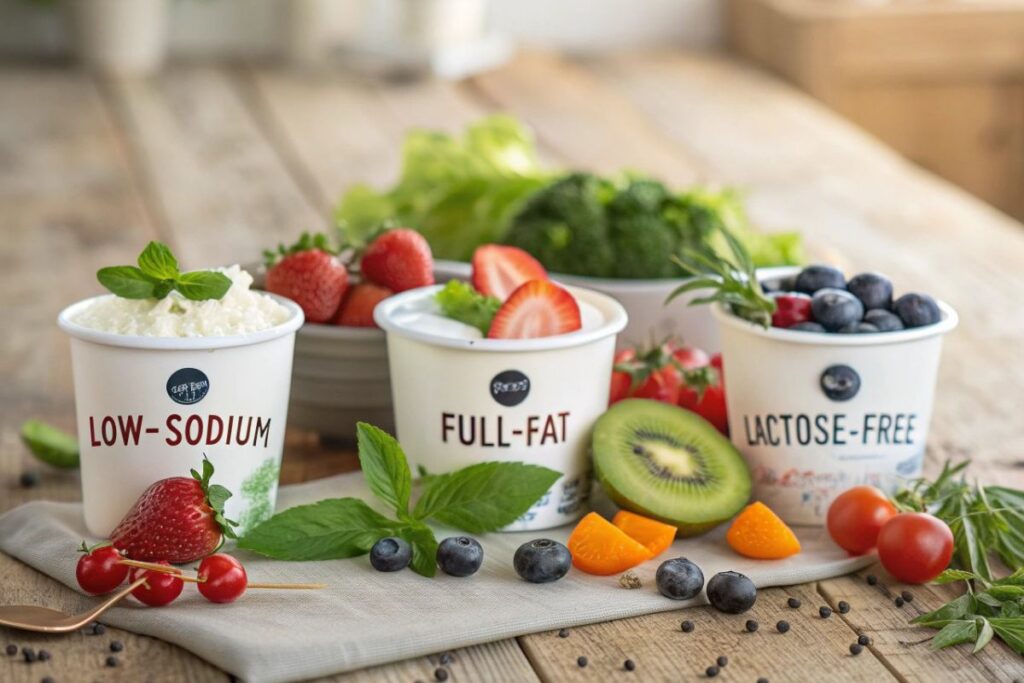Cottage cheese is a popular choice for healthy eating, thanks to its high protein and low-calorie content. However, not all cottage cheese is as nutritious as it seems. Knowing what to avoid in cottage cheese can help you make smarter choices and avoid unnecessary ingredients like added sugars, high sodium, and artificial additives. In this article, we’ll explore what to look out for when choosing the healthiest cottage cheese for your diet.
Table of Contents

Is Cottage Cheese Always Healthy?
High Sodium Content
Sodium is often added to cottage-cheese to enhance its flavor and preserve freshness, but it can be problematic when consumed in large amounts.
- Why It’s a Problem:
High sodium intake can lead to water retention, bloating, and even high blood pressure over time. For example, many cottage-cheese brands have 400–500 mg of sodium per serving, which is about 20–25% of the recommended daily sodium intake. Eating multiple servings a day can push you beyond healthy levels quickly, especially if your diet includes other salty foods. - What to Avoid:
Cottage-cheese brands that list salt as one of the first three ingredients often have excessive sodium. These options can taste good but may not align with your health goals. - How to Choose Better:
- Look for low-sodium or no-salt-added cottage cheese options. These varieties typically contain less than 100–150 mg of sodium per serving.
- Balance your meals by pairing cottage-cheese with potassium-rich foods, like bananas or spinach, which help counteract sodium’s effects.
Tip: If you’re unsure about the sodium content, check the ingredient list. The closer “salt” appears to the beginning, the more sodium the product contains.tion label! If sodium is listed near the top of the ingredients, it’s likely in high amounts.
Added Sugars and Flavors
While plain cottage cheese is naturally low in sugar, flavored versions can be loaded with added sugars and artificial ingredients.
- Why It’s a Problem:
Added sugars can spike your blood sugar, lead to energy crashes, and contribute to long-term health issues like weight gain and diabetes. Some flavored cottage cheese options, such as fruit-flavored varieties, contain up to 10–15 grams of added sugar per serving—nearly as much as a small candy bar! - What to Avoid:
Pre-flavored cottage-cheese, especially those with fruit mixes or syrups, often contain artificial sweeteners, high-fructose corn syrup, or processed syrups. - How to Choose Better:
- Stick with plain cottage-cheese.
- Add your own fresh fruit, like berries, pineapple, or a drizzle of honey, for natural sweetness.
- Check labels for sugar content. A healthy option should have less than 4–5 grams of sugar per serving.
Tip: Even if the label says “light” or “natural,” always verify the sugar content. Marketing terms can sometimes be misleading.healthy” or “light,” check the sugar content. Marketing can sometimes be misleading.
Artificial Additives
Many store-bought cottage-cheeses include artificial additives like preservatives, stabilizers, or thickeners to improve shelf life and texture. While these ingredients help keep the product fresh for longer, they might not be the healthiest choice for your body.
- Why It’s a Concern: Artificial additives, such as carrageenan, guar gum, or potassium sorbate, can cause digestive discomfort or allergic reactions in some people. Over time, consuming too many processed foods with additives may impact overall health.
- What to Avoid: Cottage cheese with long ingredient lists or unfamiliar chemical names is a red flag. For example:
- Carrageenan: A thickener linked to stomach irritation.
- Artificial Colors and Flavors: Often unnecessary and purely cosmetic.
How to Choose Better:
- Look for cottage-cheese with a short ingredient list—ideally, just milk, cream, and salt.
- Choose organic or minimally processed options whenever possible.
Tip: If you don’t recognize an ingredient, look it up or choose another brand with simpler ingredients.

Full-Fat Options in Excess
Full-fat cottage-cheese is undeniably creamy, rich, and satisfying, which is why many people enjoy it. However, its higher calorie and saturated fat content may not align with everyone’s dietary goals. While fats are an important part of a healthy diet, it’s crucial to manage portion sizes and choose the right type of fat for long-term health.
Why It’s a Problem
The fat content in full-fat cottage-cheese contributes to its creamy texture and satisfying taste, but it also significantly increases the calorie count and saturated fat levels compared to low-fat or fat-free versions.
- Higher Calories:
- A typical half-cup serving of full-fat cottage-cheese contains 110–120 calories, compared to around 80–90 calories in low-fat varieties. While this difference might seem small, consuming full-fat options regularly can lead to a gradual calorie surplus, especially if you eat multiple servings per day.
- Saturated Fat Concerns:
- Full-fat cottage cheese contains approximately 6 grams of total fat, with 4 grams of saturated fat per serving.
- Over time, a diet high in saturated fat may raise LDL cholesterol levels, increasing the risk of heart disease and other cardiovascular problems. This is especially important for individuals with pre-existing heart conditions or high cholesterol.
- Weight Loss Goals:
- If you’re trying to lose weight, consuming full-fat cottage cheese in large quantities may hinder your progress due to its higher calorie density compared to low-fat options.
While full-fat cottage cheese isn’t inherently bad, its regular overuse can create challenges for those aiming to manage calories, maintain heart health, or lose weight.
What to Avoid
To make full-fat cottage cheese work in your diet, avoid these common pitfalls:
- Over-Reliance: Consuming full-fat varieties as a daily staple without considering portion sizes or calorie intake.
- Large Portions: Eating a large bowl of full-fat cottage cheese can quickly add up to hundreds of calories, especially if paired with calorie-dense toppings.
- Unbalanced Meals: Using full-fat cottage cheese as the main ingredient without pairing it with low-calorie, nutrient-rich foods can create an unbalanced meal.
How to Choose Better
To enjoy cottage cheese without overloading on saturated fats or calories, follow these guidelines:
- Choose Low-Fat or Fat-Free for Everyday Use:
- Low-fat and fat-free versions of cottage cheese provide the same high protein content with fewer calories and less saturated fat. These are better suited for daily consumption, especially if you’re watching your weight or heart health.
- Save Full-Fat Options for Occasional Treats:
- If you love the taste of full-fat cottage cheese, consider it an occasional indulgence rather than a daily habit. Use it sparingly as a topping or snack to satisfy cravings without overdoing it.
- Balance Full-Fat Cottage Cheese with Healthy Foods:
- Pair it with low-calorie, nutrient-rich sides like vegetables, leafy greens, or whole grains to create a well-rounded and satisfying meal.
- For example, a small portion of full-fat cottage cheese works well with cucumber slices or a side salad.

Tip for Smart Eating
If you’re unsure about which version of cottage cheese to choose, think about your goals. For weight management or heart health, low-fat and fat-free options are ideal. If you’re looking for a satisfying, rich flavor occasionally, enjoy full-fat varieties in small amounts. Balancing your choices ensures you get the best of both worlds—taste and health.nally but shouldn’t dominate your diet if you’re focused on weight loss or heart health.
Packaging and Label Tricks
When shopping for cottage cheese, packaging can sometimes be more about marketing than the actual quality of the product. Many brands use buzzwords like “natural,” “light,” or “healthy” on their labels, which can be misleading and make it difficult to identify the healthiest option. Understanding these tactics is essential to ensure you’re making the best choice for your health.
Why It’s a Problem
The terms you see on the front of a package, such as “natural,” “light,” or “wholesome,” are not always regulated. This means they can be used loosely without requiring proof of quality or health benefits. For example:
- A “low-fat” option might still contain high levels of sodium to enhance flavor.
- A “fruit-flavored” cottage cheese could contain artificial flavorings or added sugars instead of real fruit.
- Products labeled as “natural” may still include preservatives or stabilizers, which contradict the impression of simplicity.
These labeling tricks can lead consumers to buy cottage cheese that isn’t as nutritious as it appears, potentially undermining weight loss or health goals.
What to Avoid
To steer clear of misleading products, watch out for the following:
- Vague Terms Without Context: Words like “natural” or “wholesome” that aren’t backed up by specific claims or ingredient transparency.
- Artificial Sweeteners in “Light” Versions: Some light or reduced-fat cottage cheese products compensate for flavor by adding artificial sweeteners, which might not align with your health goals.
- Lengthy Ingredient Lists: Cottage cheese should ideally have a short list of ingredients, such as milk, cream, and salt. Long ingredient lists often include unnecessary additives or preservatives.
How to Choose Better
To make smarter choices, follow these tips:
- Check the Nutrition Facts: Look for cottage cheese with low sodium (less than 150 mg per serving) and minimal added sugars (ideally under 5 grams).
- Read the Ingredient List: Ensure the ingredients are simple and easy to recognize. Avoid products with chemical-sounding additives like guar gum, carrageenan, or potassium sorbate.
- Select Transparent Brands: Choose brands that provide clear information about their ingredients and production processes. Organic or minimally processed options are often safer and healthier.
- Flip the Package: Don’t rely on the claims made on the front label. Flip the package over to examine the nutrition panel and ingredient list for the full story.
Tip for Smart Shopping
If you’re unsure about a product, compare a few brands side by side. You’ll notice that the healthiest options often have fewer ingredients and clearer labeling. For example, choose “plain, unsalted cottage cheese” over any product with added flavors or sugars.
By paying attention to the details, you can ensure the cottage cheese you buy aligns with your health and dietary goals.e over to read the details and make an informed decision!
FAQs About Cottage Cheese Choices
How can I make plain cottage cheese taste better?
Plain cottage cheese can be transformed with simple, healthy ingredients. Add fresh fruits like berries, bananas, or pineapple for sweetness, or use herbs like chives, dill, or parsley for a savory twist. You can also mix it into salads or spread it on whole-grain toast.
Looking for inspiration? Check out these creative cottage cheese recipes to upgrade your meals.
Will eating cottage cheese every day help me lose weight?
Yes, cottage cheese can support weight loss when consumed as part of a balanced diet. Its high protein content helps you stay full longer, and its low calorie count makes it easy to fit into a calorie-controlled meal plan.
Want to dive deeper? learn more about eating cottage cheese daily for weight loss.
Which is better for weight loss: cottage cheese or Greek yogurt?
Both are excellent options for weight loss due to their high protein and low calorie content. Cottage cheese has a creamier texture, while Greek yogurt contains probiotics for gut health. Your choice depends on your taste and dietary needs.
Curious about the differences? Learn more to decide which is better for your diet.
What are the disadvantages of eating cottage cheese?
Despite its benefits, cottage cheese has some downsides. It can be high in sodium, and flavored versions often contain added sugars or artificial ingredients. For those who are lactose intolerant, it may also cause digestive discomfort.
For a detailed breakdown, explore the disadvantages of cottage cheese.
Conclusion: Make Smart Choices with Cottage Cheese
Cottage cheese is a nutritious and versatile food that fits well into many diets, especially for those looking to lose weight or maintain a healthy lifestyle. However, not all cottage cheese options are created equal. By avoiding high sodium, added sugars, artificial additives, and excessive full-fat varieties, you can maximize its benefits while minimizing potential drawbacks.
Remember to read labels carefully and prioritize plain, low-sodium, or minimally processed versions. Pairing cottage cheese with fresh fruits, vegetables, or whole grains can make it a balanced and delicious addition to your meals.

Healthy Cottage Cheese Choices
Ingredients
Cottage Cheese Options
- < 150 mg Low-sodium cottage cheese Look for varieties with less than 100-150 mg of sodium per serving.
- < 5 g Cottage cheese with minimal added sugar Choose options with less than 4-5 grams of sugar per serving.
Healthy Pairings
- 1 cup Fresh fruits (e.g., berries, bananas, pineapple) Add for natural sweetness.
- 1 tbsp Honey Optional for extra flavor.
- 1 cup Vegetables (e.g., cucumber, leafy greens) To create a balanced meal.
Instructions
Choosing Cottage Cheese
- Select low-sodium or no-salt-added options for better health benefits.
- Avoid flavored cottage cheeses that contain added sugars.
- Look for cottage cheeses with a short ingredient list, focusing on milk, cream, and salt.
Preparing Meals
- Pair cottage cheese with fresh fruits or vegetables for enhanced flavor and nutrition.
- Use full-fat cottage cheese sparingly to mitigate calorie intake.
- Read labels carefully and prioritize plain options without misleading marketing claims.





